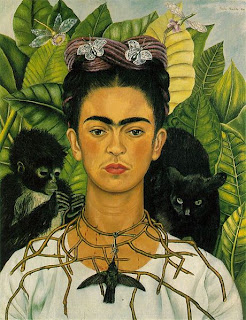Pascale Petit and the paintings of Frida Kahlo
Frida Kahlo’s life and work seems to be the source of quite a lot of literary inspiration at the moment, appearing in Barbara Kingsolver’s novel The Lacuna and in a new volume of poems by Pascale Petit called ‘What the Water Gave me’.
I’m interested in poetry and fiction based on biography, and so last night I went to a reading of the poems with a slide show of the paintings that gave them their titles. Pascale Petit was herself an artist, trained at the Royal College of Art, so I was also interested to see how that would inform the poetry.
Pascale said that she hadn’t felt constrained to work too close to the images, but felt free to create alternative images with the words. I did wonder whether the poems would stand alone, without the images they reference, and whether they would make sense to anyone who didn’t know about Frida Kahlo’s life. That’s a question I can’t answer, since I love the paintings and I’ve been fascinated by Frida’s biography since I first heard about her as a young girl.
The poems neither explain nor describe the paintings - they are a parallel reality, trying to inhabit the mind that created them, exploring the creative processes that made art out of trauma and suffering. Frida had polio as a child, which left her with a damaged leg and then her abdomen and vagina were pierced by the handrail of a bus in an accident when she was 18. You can read Pascale's poem 'The Bus' here. Frida's pelvis was also broken and she spent much of her life in pain, trapped in what Pascale in Frida’s voice calls ‘the slaughterhouse of my body’. She also had to cope with her husband - the slippery, egotistical Diego Rivera who appears in the poems ‘guzzling monkey brains/and hummingbird hearts’.
Les Murray has commented on the ‘powerful mythic imagination’ at work in Pascale’s poetry and there is a surreal gloss that characterises her work and sits easily with the surrealisim of Frida Kahlo’s art. Pascale doesn’t shrink from the graphic violence of the paintings, but the poetry does lack the sensuality of it - the velvet fur of the spider monkeys, swollen prickly pears, symbolically bleeding onto the plate, Frida with her hair loose, every strand a silky thread of desire.
The poetry is beautiful, precise, orderly, and very impressive. It stands separate from the vivid chaos of Kahlo’s life.
My favourite poem of Pascale’s is ‘The Hieroglyph Moth’ from her collection ‘The Treekeeper’s Tale’ and which is also connected to an image.
I’m interested in poetry and fiction based on biography, and so last night I went to a reading of the poems with a slide show of the paintings that gave them their titles. Pascale Petit was herself an artist, trained at the Royal College of Art, so I was also interested to see how that would inform the poetry.
Pascale said that she hadn’t felt constrained to work too close to the images, but felt free to create alternative images with the words. I did wonder whether the poems would stand alone, without the images they reference, and whether they would make sense to anyone who didn’t know about Frida Kahlo’s life. That’s a question I can’t answer, since I love the paintings and I’ve been fascinated by Frida’s biography since I first heard about her as a young girl.
The poems neither explain nor describe the paintings - they are a parallel reality, trying to inhabit the mind that created them, exploring the creative processes that made art out of trauma and suffering. Frida had polio as a child, which left her with a damaged leg and then her abdomen and vagina were pierced by the handrail of a bus in an accident when she was 18. You can read Pascale's poem 'The Bus' here. Frida's pelvis was also broken and she spent much of her life in pain, trapped in what Pascale in Frida’s voice calls ‘the slaughterhouse of my body’. She also had to cope with her husband - the slippery, egotistical Diego Rivera who appears in the poems ‘guzzling monkey brains/and hummingbird hearts’.
Les Murray has commented on the ‘powerful mythic imagination’ at work in Pascale’s poetry and there is a surreal gloss that characterises her work and sits easily with the surrealisim of Frida Kahlo’s art. Pascale doesn’t shrink from the graphic violence of the paintings, but the poetry does lack the sensuality of it - the velvet fur of the spider monkeys, swollen prickly pears, symbolically bleeding onto the plate, Frida with her hair loose, every strand a silky thread of desire.
The poetry is beautiful, precise, orderly, and very impressive. It stands separate from the vivid chaos of Kahlo’s life.
My favourite poem of Pascale’s is ‘The Hieroglyph Moth’ from her collection ‘The Treekeeper’s Tale’ and which is also connected to an image.



Comments
Post a Comment